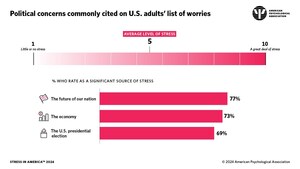Few Americans Aware of Law Broadening Access to Mental Health Treatment
APA survey reveals nearly 90 percent of Americans have never heard of mental health parity or law
WASHINGTON, Jan. 24, 2011 /PRNewswire-USNewswire/ -- An overwhelming majority of Americans remain unaware of a law mandating equal coverage of mental health benefits by insurance companies, a cause for concern by psychologists at a time when one-quarter of Americans are reported to have a mental health disorder and only a minority are receiving treatment.
In a survey recently conducted by the American Psychological Association (APA), 89 percent of Americans said they had not heard of the Mental Health Parity and Addiction Equity Act of 2008, a federal law now in effect for people who have health insurance through a group or employer plan. And only a scant seven percent of respondents said they recognized the phrase "mental health parity."
More than 26 percent of American adults have a diagnosable mental health disorder, but of those, only 33 percent are receiving care, according to data from the National Institute of Mental Health. And of that number, one-third is receiving treatment that is considered only minimally adequate.
In the APA survey, which was conducted online by Harris Interactive among 2,940 adults in December 2010, nearly one-third of adults (29 percent) said they don't know if they have adequate mental health coverage and 45 percent said they are unsure if their insurances reimburses for mental health care.
The law, signed by President Bush in 2008 and put into effect for most plans on Jan. 1, 2011, extends equal coverage to all aspects of health insurance plans. It preserves existing state mental health and addiction parity laws while extending protection of behavioral health services to 82 million Americans not previously protected by state laws. The law also requires parity for mental health coverage when provided both in-network and out-of-network.
Among other benefits, the law equalizes the out-of-pocket cost of mental health treatments to those of physical health coverage. No longer will insurance consumers pay deductibles and co-pays that are more costly for psychotherapy than a visit to their family physician. The parity act also removes the cap on the number of outpatient visits allotted per year, as long as no cap exists for physical health-related visits.
"The implementation of mental health parity is a great milestone in recognizing that mental health care is just as crucial to a healthy life as prevention and treatment of physical ailments," said psychologist Katherine Nordal, Ph.D., APA executive director for professional practice. "But laws alone have clearly not been enough to put parity into full use. Our survey shows that too few Americans are aware of these new rights and too many people have avoided treatment because of costs. And without that knowledge, people may keep not getting the care needed for themselves or a family member."
More than half of respondents (56 percent) selected cost of care as a reason why they or a family member might give for not seeking treatment. The other commonly selected reasons pointed to a need for improved communications about mental health treatment: not knowing how to find the right professional (42 percent) and not knowing if seeking help is appropriate (40 percent).
And while stigma is often considered a deterrent to seeking professional mental health care, only eight percent of adults cited stigma as a top reason for not seeking treatment. An equal number reported their top concern as privacy or confidentiality.
On a positive note, this lack of awareness did not translate to lack of support. The majority of adults surveyed said they agree with parity for various features of mental health benefits coverage, such as equality in co-pays, prescription costs, deductibles, out-of-pocket maximums and limits on hospital days or outpatient sessions.
Mental health disorders are the leading cause of disability in the United States, according to the National Institute of Mental Health, and suicide was the 10th leading cause of death in the country in 2007.
"Science continues to demonstrate how absolutely the mind and body are connected. Our government has mandated that insurance companies recognize that connection as well and provide for treatment of the whole person, covering physical and mental health care equally," Nordal said. "But it's also clear that we need to communicate more effectively with employers and potential consumers of mental health services so that parity can be fully implemented and people can more easily obtain the services they need."
A summary of the survey findings is available online at http://www.apa.org/news/press/releases/parity-law.pdf.
Methodology
The survey was conducted online within the United States by Harris Interactive on behalf of the American Psychological Association, between December 14 and 27, 2010, among 2,940 adults aged 18+ who reside in the United States.
The American Psychological Association, in Washington, D.C., is the largest scientific and professional organization representing psychology in the United States and is the world's largest association of psychologists. APA's membership includes more than 150,000 researchers, educators, clinicians, consultants, and students. Through its divisions in 54 subfields of psychology and affiliations with 60 state, territorial and Canadian provincial associations, APA works to advance psychology as a science, as a profession, and as a means of promoting health, education, and human welfare.
Harris Interactive is a global leader in custom market research. With a long and rich history in multimodal research that is powered by our science and technology, we assist clients in achieving business results. Harris Interactive serves clients globally through its North American, European, and Asian offices and a network of independent market research firms. For more information, please visit www.harrisinteractive.com.
SOURCE American Psychological Association
WANT YOUR COMPANY'S NEWS FEATURED ON PRNEWSWIRE.COM?
Newsrooms &
Influencers
Digital Media
Outlets
Journalists
Opted In





Share this article